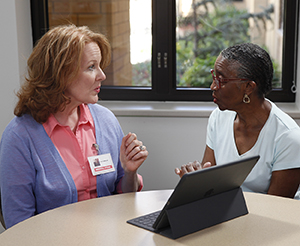Surgery for a Brain Aneurysm: Recovery at Home
Surgery for a Brain Aneurysm: Recovery at Home
An aneurysm may have affected your loved one’s body functions, skills, and emotions. He or she may move on to a skilled nursing facility, a rehabilitation center, or go home and return for therapy as an outpatient. You, too, can help him or her recover.
Regaining strength and skills
Depending on the site of an aneurysm, certain abilities may have been affected. This is because each part of the brain controls certain functions. With special help, many people regain strength and some skills. A physical therapist helps strengthen muscles. An occupational therapist teaches daily skills, such as getting dressed and bathing. A speech therapist helps improve swallowing, as well as speech. Recovery of these functions is often not complete, and recovery occurs at unpredictable rates that vary from days to months. The goal of therapy is to maximize the speed and ultimate potential of the recovery.
Changes in emotions
The aneurysm may have affected your loved one’s emotions. He or she may be depressed, worried, or mentally tired. These feelings should go away with time. Some people also have trouble controlling their emotions. They have sudden mood shifts. The shifts may be out of context with what is going on. This is called lability. For instance, your loved one may cry after telling a joke. In many cases, lability lessens over time.
How you can help
You can help your loved one in many ways. Make sure he or she returns for all follow-up visits as requested. Talk with the healthcare provider if any sadness or emotional ability does not improve on a weekly basis. If you don't see any improvement in the first weeks, talk with a neuropsychologist, psychologist, or psychiatrist. And check that your loved one takes all medicines as directed. Be patient with mood swings, pain, or extreme tiredness (fatigue) that your loved one may feel. Also, social work services in the medical center can help coordinate resources to help your loved one and your family with recovery.
When to call the surgeon
Call the surgeon right away if you notice any of the following in your loved one:
Involuntary movements or a seizure
A severe headache
Any loss of function
A high or long-lasting fever
Drainage, redness, or pain at the incision site
Fainting or falling. Either of these may signal changes in brain function.
Pain in leg or swelling
Ongoing nausea or vomiting
Burning during urination
Before stopping any of your medicine
Your loved one may have to take a few medicines to control pain, blood pressure, and other problems. It’s very important that all medicines be taken as directed. Medicines work best if they are taken on time.
Updated:
March 06, 2018
Reviewed By:
Hanrahan, John, MD,Image reviewed by StayWell art team.,Sudheendra, Deepak, MD
